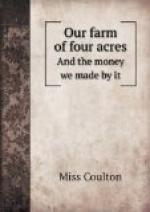It was a source of great amusement to ourselves, as well as to the children, by whom it was always considered a treat to run in the meadows, with barley in their little baskets, to the “coobiddies.” When we first had the poultry we kept them in the stable-yard; but we soon found they did not thrive: they had been taken from a farm where they had the free range of the fields, and drooped in confinement, and from want of the grass and worms which they had been accustomed to feed on. We had a house constructed for them in the meadow nearest the house, and soon found that they throve much better, and did not require so much food. We had no trouble with them, except in seeing that the house was cleaned out daily. Through the fields flowed a stream of clean water, consequently our ducks throve well. The bushel of meal which figures in our accounts was for them; they used to have a little mixed in hot water once a day. We soon left it off, for we found the rice boiled in skim-milk was equally good for them, and much cheaper.
Poultry of all kinds are very fond of “scraps;” the children were always told to cut up pieces of potatoes, greens, or meat, which they might leave on their plates at the nursery dinner; and when they were removed to the kitchen, they were collected together and put into the rice-bowl for the chickens. We always fed them three times daily: in the morning with rice, in the middle of the day with “scraps,” and in the evening they had just as much barley thrown to them as they cared to pick up eagerly.
We have heard some persons complain of the great expense attending a poultry-yard, but this arises from the person who has the charge of them throwing down just as much again grain as the fowls can consume. We have ourselves often seen barley trodden into the ground, if occasionally we left the task of feeding to the lad.
It must, of course, be impossible at all times for a lady to go into the fields for the purpose of feeding her chickens; the only plan to prevent waste is to have a meal-room in the house, and as much given out daily as is considered necessary for the consumption of the poultry. This is some little trouble, but will be well repaid by having at all times cheap and wholesome fowls, etc.
We have hitherto only spoken of the profit which may be obtained from a fowl-yard, when the stock is purchased. The farmer’s wife, from whom we bought ours, of course gained some money by their sale. When we reared our own chickens from our own eggs, we received much more emolument from our yard; but in this little volume it is my purpose to show how a person should commence, who leaves London or any other large town for a suburban residence.
It must always be borne in mind, that nothing will prosper if left wholly to servants; the country proverb of “the master’s eye fattens the steed,” is a very true one, and another is quite as good: “the best manure you can put on the ground is the foot of the master.” As a proof of our assertion we will, in the next chapter, detail the disasters we experienced when we left the charge of rabbits to the superintendence of a servant.




